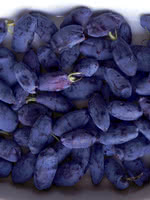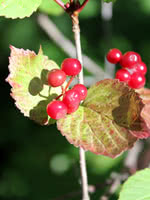Mon-Fri 9am - 5pm Mountain time
Honey Bee Haskap (Honeyberry) vs Lowbush Cranberry
Lonicera caerulea Honey Bee
Viburnum edule
NOT AVAILABLE THIS SEASON - MIGHT RETURN
NOT AVAILABLE THIS SEASON - MIGHT RETURN
Honey Bee Haskap produces tarter fruit than the Aurora and Borealis varieties and is known for bearing fruit at a younger age. The flavour of Haskaps is generally described as a cross between a blueberry and a raspberry. Honey Bee Haskaps are well suited to fresh eating, freezing, baking, and preserves.
The Honey Bee Haskap has stronger fruit holds than other varieties so the berries stay on the bush longer. The berries do not roll well so they are not recommended for mechanical harvesting.
For optimal fruit production, cross-pollination is required. Haskaps need to be planted with a compatible variety. Compatibility is influenced by both bloom time and genetics.
Honey Bee Haskap is an early-pollinating variety and pairs well with Aurora, Borealis, Tundra, and Indigo Gem.
Lowbush Cranberry is a short, deciduous shrub native to North America. Its white flowers bear sour but edible fruit that ripens to a brilliant red in fall. Lowbush Cranberry's small size makes it suitable for urban use; buyers will also find it useful if trying to reclaim land back to its original species or when landscaping with native species in damp conditions.

